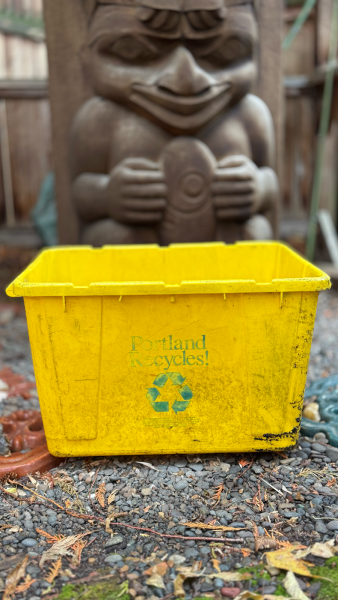
In 2021, the Oregon legislature passed the Recycling Modernization Act (RMA), which came into effect on Jan. 1, 2022. The goal of the RMA is to “update Oregon’s outdated recycling system by building on local community programs and leveraging the resources of producers to create an innovative system that works for everyone,” according to the Oregon Department of Environmental Quality (DEQ). The recycling program changes stipulated by the Act went into place in July 2025.
As stated by David Allaway, a policy analyst at the DEQ with more than 25 years of experience, the RMA was created out of necessity. “Oregon’s foundational recycling laws were adopted in 1983 and 1991, when recycling looked nothing like it does today,” he explains. “Residents used to separate materials by hand, and almost all recyclables went to domestic markets. None of those characteristics are present anymore.”
As the state transitioned to “commingled” recycling — where residents mix paper, metal, and plastic — Oregon became reliant on sortation facilities that, as Allaway puts it, “weren’t always operating as promised.” Megan Whisnand, an AP Environmental Science teacher at Franklin, says that commingled collection is “one of the big issues with recycling … people throw in things that don’t actually get recycled. It’s called wishful recycling — like, ‘I’ll just put it in the bin and hope it gets recycled.’”
Throughout the 2010s, China — once the largest importer of recyclables internationally and for Oregon — implemented policies that restricted the importable materials and the allowable level of contamination. Having effectively closed its doors to the state, the existing recycling practices were dramatically disrupted. “Overnight, Oregon’s recycling system was thrown into disarray,” Allaway says. “It became clear that our laws were woefully antiquated and incapable of responding to this crisis.”
The RMA’s goals are to reduce contamination and improve sorting quality. Most notably, the RMA introduces the idea of producer responsibility. Under this model, companies that sell packaged goods, paper, or single-use food serviceware in Oregon must join a Producer Responsibility Organization (PRO). Producers will report how much packaging they sell to the state and pay fees based on material type and quantity. “This marks a fundamental shift in who pays for recycling,” Allaway explains. “For decades, producers have externalized the costs of managing their products at the end of life. Those costs — from pollution to waste handling — have been paid by the public. The RMA begins to correct that imbalance.”
In addition, starting in 2027, recycling facility workers will be guaranteed a living wage and benefits, a first for recycling programs in the U.S.. The act also invests in reusable initiatives, including “a significant fund that next year will begin delivering grants to enable school cafeterias to install dishwashers and switch from single-use to reusable dishware,” Allaway says.
The RMA is a law designed to provide the people of Oregon with assurance that if they properly prepare and separate materials for recycling, those materials will actually be recycled in ways that are positive for people and the planet. “Oregon’s law doesn’t just aim to recycle more — it aims to recycle better,” Allaway concludes. “We’re ensuring that recycling truly benefits people and the planet.”



































